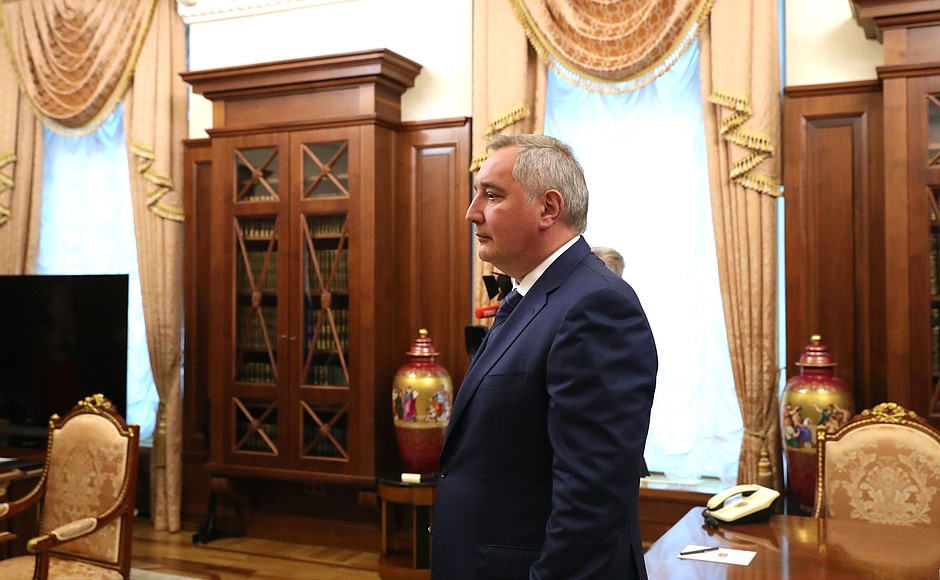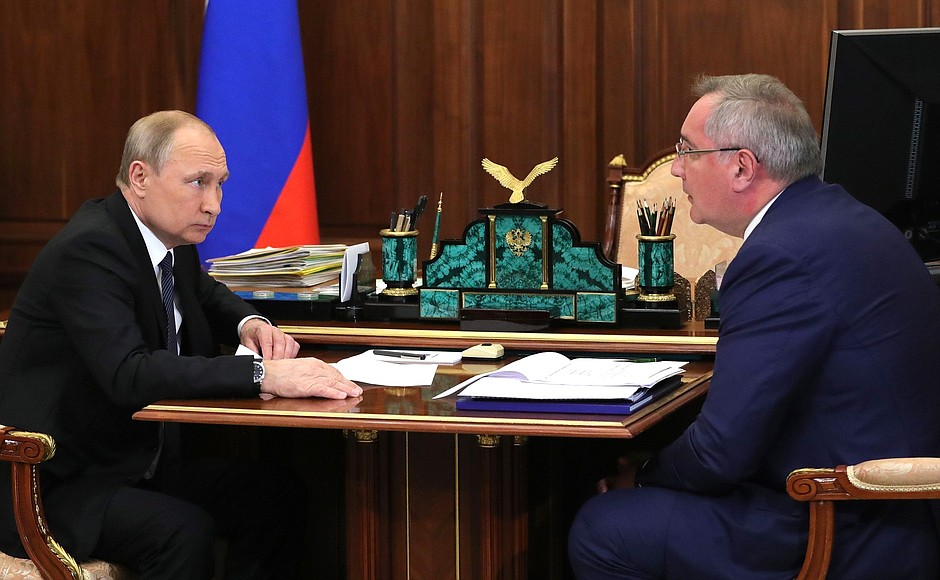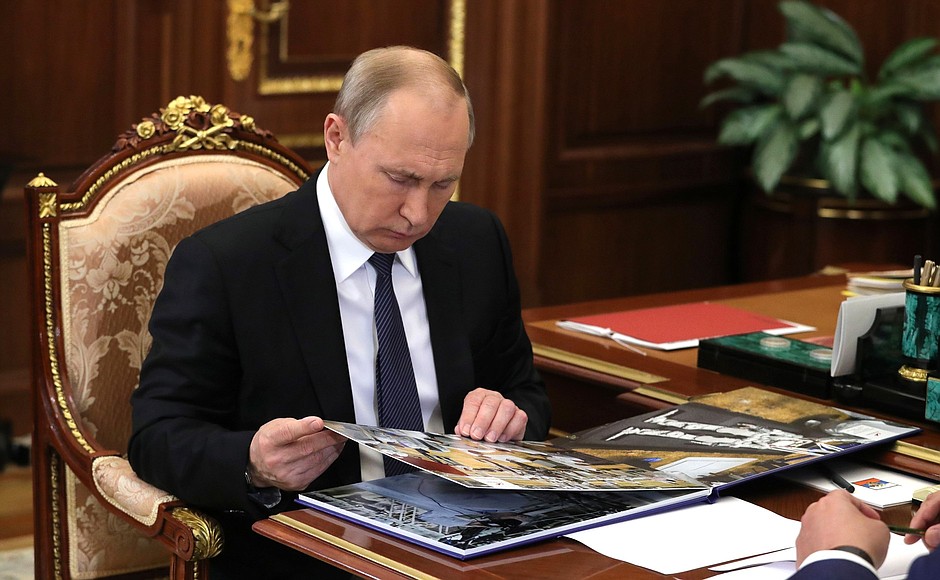General Director of the Roscosmos State Corporation for Space Activities Dmitry Rogozin: Mr President, I would like to update you on the corporation’s performance in the first six months of this year, including the manned programme and our economic figures.
By this time, we have launched nearly as many missions as last year.
President of Russia Vladimir Putin: As many as in the same period of last year?
Dmitry Rogozin: No, last year we launched approximately as many missions as in the first half of this year. This is why we expect to launch some 40 missions this year, as I reported back in winter. But the overall figure depends on our partners’ readiness in terms of payload and spacecraft.
Vladimir Putin: Have more missions been launched from the Guiana Space Centre than from Vostochny?
Dmitry Rogozin: Yes. We will launch at least four missions from the Vostochny Space Launch Centre next year, and we will gradually increase the number. The infrastructure is finished there, and I would like to say that this year we have launched an important mission from Vostochny, the Meteor satellite, designed to replace the one we lost in late 2017 and so replenish the satellite group.
Another important mission was the launch of the Spektr-RG space lab in the interests of the Russian Academy of Sciences (RAS). This spacecraft is reaching the Lagrange point now, from which we expect it to transmit very important data for our fundamental science. It was a joint mission with the RAS. We were worried, but everything went off very well.
Another major fact I would like to report to you, Mr President, is that we have started preparations to launch a new module to the International Space Station (ISS). Unlike our American and European partners, we plan to launch three modules in succession, in 2020, 2021 and 2022, so as to seriously expand the Russian Orbital Segment.
There are plans for a very important launch mission in August. I would like to show you something.
Vladimir Putin: Go ahead.
Dmitry Rogozin: It is a humanoid robot, which we will send to the ISS to help the crew. We launched this project back in 2012 under a contract of the Foundation for Advanced Research Projects.
The potential risks of working in outer space, especially in open space, are huge. We have created a backup system in the form of an avatar. We will be the first in the world to launch this object, a space robot, to the ISS on August 22. Its name is FEDOR, Final Experimental Demonstration Object Research.
This robot will copy the cosmonauts’ actions. Initially, it will be controlled from the station, but later we plan to learn to control its actions from the Flight Control Centre. There are also plans that in the future this robot will be used to fly into deep space.
I would like to say a few words about the corporation’s economic performance. We plan to greatly increase our consolidated proceeds this year, to 444 billion rubles from 352 billion last year.
Vladimir Putin: Is this the target figure?
Dmitry Rogozin: Yes, it is, and we are moving steadily towards it. In other words, we expect to reach this figure in accordance with our contracts.
Our consolidated net profit will increase fivefold. It will not be large, but it will be a major achievement, considering that in the past years we did not have a net profit at all.
Vladimir Putin: You were in the red two years before.
Dmitry Rogozin: Yes, we were. Labour efficiency has increased by 8 percent. Not that I am satisfied with this achievement, because we need to do very much to restructure the industry, but still, 8 percent is appreciable growth.
Vladimir Putin: Yes, it is a good increase.
Dmitry Rogozin: This is because of considerable loan exposure, Mr President. I would like to put forth some of our proposals on reducing this burden on our companies, applying the same scheme we plan to use for the other state corporations and taking into account the designation of Promsvyazbank as the backbone bank for our sector.
Regarding diversification, I would like to say that we have started working towards this end as per your instruction. We already produce 2,000 pieces of equipment for the fuel and energy sector within the framework of the import substitution programme. These include wellhead equipment and isolation valves, as well as turbine pumps. We have compiled a catalogue of such items for our partners, so that they know what our companies produce.
Vladimir Putin: Have they sought your equipment?
Dmitry Rogozin: Yes, they have. We have signed contracts with Gazprom, Gazprom Neft, Transneft and our other leading companies. It is a very important part of work for our companies, considering that the production load at the leading companies in the sector is often below 50 or 40 percent. Such contracts help fill the gap.
Vladimir Putin: Besides, these [oil] companies are unable to buy the [foreign] equipment they need.
Dmitry Rogozin: Exactly. The machine-building capacities of the Roscosmos companies can do this job, and not only for the fuel and energy sector. We are working on interesting light rail projects as well. We have signed contracts with the Chelyabinsk Region, and we hope to deliver a very interesting vehicle, which we are creating at the Ust-Katav rail carriage works, to St Petersburg.
Vladimir Putin: The range of your products is impressive.
Dmitry Rogozin: Yes, we do have many engineering capacities that are needed for the space industry, primarily engine-building capacities, power machines and power generation. We can produce enough small gas-fuelled power units to provide electricity to the Arctic. We produce 6–8 MW power units, which can be used under our Arctic development projects.
In addition, we have designed an interesting solid waste management technology at the Keldysh Research Centre. It can be used to incinerate the most resistant waste, which is now buried at landfills. I believe that this is extremely important for mega-cities. I have recently submitted this proposal to [Moscow Mayor] Sergei Sobyanin. We will work together on this job.
I would like to say a few words about the Khrunichev Centre. We managed to reduce its debt burden by 27 billion rubles in 2018 and to put off debt repayment until 2029. We are grateful to the lending banks for meeting us halfway on this.
We have also coordinated the payment of our penalties in instalment. And lastly, regarding the National Space Centre project, which you have supported or rather initiated. I will show you one of the versions which we have opted for together with Sergei Sobyanin.
Vladimir Putin: I would support it as well.
Dmitry Rogozin: This is great, but still. It is a rough outline that is fully in keeping with the design for a 250,000 square metre project. We will rally 20,000 of our workers. This is how it will look. This is Myasishchev Street, and these are residential buildings which already stand there. In other words, this is a real photo. And here you see a tower growing; it will host the central engineering office of Roscosmos and the offices of our companies. Behind that tower will be the Khrunichev plant, which will be transformed into… First of all, we will preserve and develop the plant in which we are now investing additional funds.
The implementation of the National Space Centre project will allow us to complete the financial rehabilitation programme by 2024 or four years sooner than it was initially planned. The idea of the technology park will attract the companies in the sectors that are connected with Roscosmos anyway, such as microelectronics, mechanical engineering and aviation. We are working on this project together with the Moscow City Government. I just wanted to tell you that we are steadily moving towards our goal.
Vladimir Putin: You will not sell land, will you?
Dmitry Rogozin: Absolutely not.
Vladimir Putin: I hope so. Thank you.
<…>


